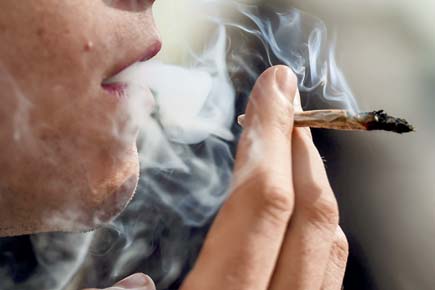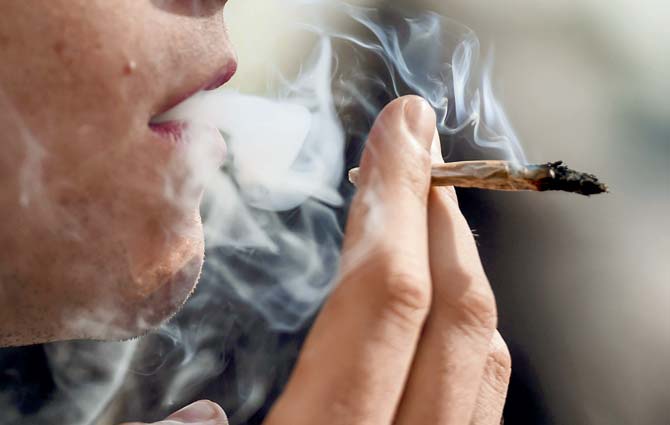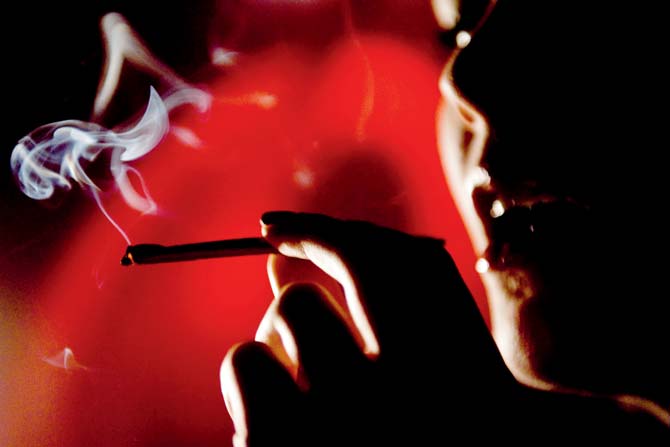Anti-narcotics cops, psychiatrists and counsellors brace for havoc as a new cannabinoid-laced weed grows in popularity among the city's youngsters


The synthetic drug is most commonly sold as a coating on plant leaves, meant to be smoked. Representation pic/Getty Images
Sayonara marijuana, Mumbai's youths have turned to a new drug to 'spice' up their lives. Sold as a new type of weed, the drug is far from natural, and has cops and doctors worried about its dangerous side effects. Meanwhile, girls in schools and colleges are flocking to buy it because of a unique feature - it doesn't show up in drug tests.

Although it looks like natural weed, Spice is far more dangerous. Representation pic/Getty Images
Young girls, in particular, form the biggest market for the narcotic, called Spice or K2 or synthetic weed. Peddlers sell it to them with the promise that it will not be detected in drug tests, allowing users to remain above suspicion.
It goes unseen
The drug's power to remain invisible has allowed it to reach far and wide without alerting doctors or cops. That is, until the daughter of a senior state bureaucrat was caught smoking up in the bathroom. The 17-year-old's parents hauled her to Masina hospital for treatment, but doctors were shocked when they found no evidence of cannabis in her urine test. Weed or cannabis can be traced in urine tests for at least 20-25 days after use, but the teen was confident her samples would come up negative, so she even encouraged the doctors to conduct a test.
Two other girls (aged 14 and 16 years) from the northern suburbs of city reported to city-based psychiatrist Dr Harish Shetty with similar symptoms. "The girls say they were told this substance was cannabis, but the test results were negative. Preliminary research on this suspicious substance indicates it to be Spice, which is popular in Australia as 'Chronicle'. Excessive consumption can be dangerous and parents should be vigilant in looking for the symptoms," said Dr Shetty said.
Since the last three months, doctors have observed several such cases pouring into psychiatry clinics and drug rehab centres, with patients showing similar symptoms to cannabis addiction, but without any trace of it in their body. Currently, there is no medical kit in the nation that can detect the drug.
Not natural or safe
Peddlers tell their young customers that Spice is a safe, herbal drug but, in fact, there is nothing natural or safe about it. "All its features are similar to weed, but its side effects are more hazardous. Long-term use can result in three serious side effects – epilepsy, psychosis and toxicity," said Dr Priyanka Mahajan from Masina hospital.
Spice was first sold in the UK in 2004. At first, people believed it was a mixture of harmless herbs, so it was legally sold all over the world, especially via the Internet. It was packaged in small colourful sachets, and generally marketed as an herbal smoking tobacco substitute, or as incense. It also looks like tobacco.
It gives a high that is similar to weed, but unlike the natural stuff, Spice gets stuck to the brain's receptors permanently. Excessive consumption of the drug can turn a user into a living zombie, doctors have warned. Now, in most countries around the world, including the United States, synthetic weed is illegal.
Not illegal here
"Since it cannot be detected and is a new drug, girls are also lured into trying the drug with the assurance that it doesn't fall under the Narcotic Drugs and Psychotropic Substances Act," Dr Sagar Mundada, psychiatrist at KEM Hospital.
Kumar Sanjay Jha, zonal director of the Narcotics Control Bureau (NCB) confirmed that not a single case of synthetic weed had been reported to them. No one has approached Mumbai Police's Anti-Narcotics Cell (ANC) over this matter either. "We have learnt through our sources that a new drug called Spice or synthetic weed is gaining popularity among drug addicts, but as of now no case has been registered. We have pressed our informants for some concrete information on this drug, after which we will take strict action," said Shivdeep Lande, deputy commissioner of police (ANC).
 Subscribe today by clicking the link and stay updated with the latest news!" Click here!
Subscribe today by clicking the link and stay updated with the latest news!" Click here!







